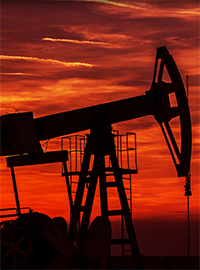| Fracking Miracle: The Latest American Exceptionalism |
 |
|
By Timothy H. Lee
Wednesday, December 12 2018 |
Unless you're under the legal drinking age of 21, you probably recall the days when the possibility of American energy independence seemed farcical, little more than a meaningless political slogan inserted into presidential State of the Union speeches as a formality more than any sincere aspiration. Throughout the 1970s, oil-producing Middle Eastern nations held the United States economy by a metaphorical leash through their ability to impose crippling oil embargoes, to punish us for our support of Israel or whatever else we'd done to raise their ire. On multiple occasions, depressingly long lines of cars waiting to refuel at gas stations offered a grim reminder of our precarious dependence upon nations hostile to U.S. interests. As recently as 2006, President George W. Bush raised eyebrows and heckles when he used his own State of the Union speech to promote "wood chips and stalks, or switch grass" as an answer to our decades-old energy dependency. Then, exhibiting his typical razor-sharp economic and geostrategic prescience, Barack Obama mocked the "Drill, Baby, Drill" slogan by assuring us that "we can't drill our way" out of the problem. "I give out this statistic all the time," Obama once asserted with his trademark arrogance, "and forgive me for repeating it again, but America holds about two percent of the world's proven oil reserves. What that means is that even if we drilled every drop of oil out of every single one of the reserves that we possess - offshore and onshore - it still wouldn't be enough to meet our long-term needs." For good measure, he added: "We can't place our long-term bets on a finite resource that we only control two percent of - especially a resource that's vulnerable to hurricanes, war and political turmoil." Unlike, say, wind or solar energy that are invulnerable to cloudy days, low winter sunlight or long stretches of low wind, apparently. But then a funny and unanticipated thing happened: American innovation created the shale revolution. Last week, the U.S. achieved the status of net oil and refined fuel exporter for the first time since 1973. For the week ending November 30, the U.S. exported 9 million barrels of oil, gasoline, diesel, jet fuel and other petroleum fuels, versus an aggregate 8.8 million barrels imported. To provide context and illustrate the magnitude of that achievement, recall that oil imports reached a record of 13 million barrels per day in 2005, when nobody saw the fracking revolution just around the corner. In fact, the U.S. now stands not just as a net oil exporter, but also as the world's top producer of oil and natural gas. Drill, baby, drill. This obviously marks a critical symbolic milestone, one in which we should take rightful pride. In terms of geostrategic advantage, it offers much, much more. For example, resurgent American oil production has punished Iran. Not only has the drop in global oil prices due to American fracking erased the financial rewards that came to Iran via the misguided Obama nuclear accord from which President Trump withdrew, but it has also allowed us to hammer Iran with new sanctions without threatening a sharp and disruptive jump in oil prices. Conspicuously, American oil production that President Trump encourages also punishes Russia. Boosting global supplies undercuts Russia's critical source of revenue, and it also diminishes Vladimir Putin's ability to coerce other countries through threat of embargo. Some kind of "collusion," that. The socialist dystopia of Venezuela has also suffered due to American fracking, because its dictatorship also relies upon oil revenues to sustain it and serve as a poster child of success for similar aspiring dictatorships. In similar fashion, you may have noticed how much more compliant Middle Eastern nations like Saudi Arabia have been in recent years, even warming up to Israel. For years, domestic opponents of petroleum use claimed that it only meant perpetual reliance upon Middle Eastern dictatorships and obsession with political affairs in the region. But when the fracking revolution began to erase those concerns, they shifted the goalposts and opposed new extraction techniques despite the energy independence that it promised. Fortunately, they've lost the argument, at least for the time being. It proves once again how much we have to gain when we keep the faith in American innovation, and allowing market incentives to work. It also proves once again that American exceptionalism lives. |
Related Articles : |
























